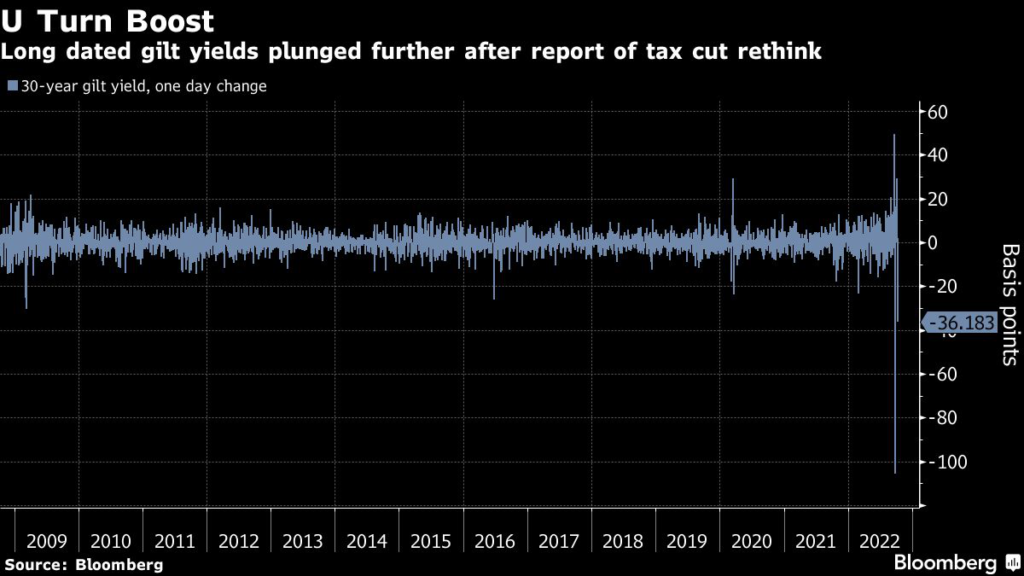UK Prime Minister Liz Truss’s administration is preparing to abandon a central part of its tax-cutting agenda following weeks of chaos in financial markets — a potential shift that sent the pound and gilts surging.
(Bloomberg) —
UK Prime Minister Liz Truss’s administration is preparing to abandon a central part of its tax-cutting agenda following weeks of chaos in financial markets — a potential shift that sent the pound and gilts surging.
Officials at 10 Downing Street and the Treasury are drafting options for Truss, but no final decision has been taken, according to a person familiar with the matter who asked not to be identified. The premier could scrap her pledge to keep corporation tax unchanged next year, and instead raise it as planned by her predecessor Boris Johnson, the Sun said.
Officials are waiting for Chancellor of the Exchequer Kwasi Kwarteng to return from Washington, where he has been attending meetings of the International Monetary Fund. Reports of a u-turn on a key economic policy in London while he is abroad has sparked speculation he will be forced to quit his job. Speaking from the US capital, Kwarteng said he’s “not going anywhere” and vowed to press on with his strategy.
Truss’s fledgling administration is scrambling to regain its economic credibility after she took financial markets by surprise with a tax-cutting plan that left, according to the Institute of Fiscal Studies, a £60 billion hole in the public finances. The package roiled markets, sending the pound at one point to an all-time low against the dollar and forcing the Bank of England to intervene in the bond market to prevent a key part of the pensions industry from collapsing.
The pound jumped as much as 1.8% on Thursday to $1.1295. UK government bonds extended a rally, with 30-year yields falling 46 basis points to 4.36%.
“Has the government finally heeded the calls from markets and the Bank of England? Price action in gilts and the pound suggests markets believe so,” said Simon Harvey, head of FX analysis at Monex Europe.
The plan to freeze corporation tax next year has come in for particular attention from detractors within Truss’s own Tories. Under a strategy set out by the previous Conservative administration, the levy on companies was due to rise to 25% from 19% in April. But scrapping that move was one of the key measures in Kwarteng’s fiscal plan announced Sept. 23.
Tories Demand U-Turn on Tax Cuts as Pressure Builds on Truss
The initial market reaction on Thursday suggests that a U-turn on corporation tax — along with the bank’s greater buying activity this week — could help ease any turbulence next week after the Bank of England halts its bond purchases on Friday. Investors will be focused on the details of the plans the government is drawing up, and that may determine whether the broad market rally can be sustained.
“Given investors are short, the reaction of sterling is not a surprise,” said Gareth Gettinby, portfolio manager at Aegon Asset Management. “Ultimately, the UK has an extremely negative external balance that remains reliant on foreign funding which remains a negative. So a short term bounce on government noise and then expect the currency to weaken.”
BOE Governor Andrew Bailey had put his credibility on the line this week when he told investors that gilt-buying program will end as planned on Friday, brushing off calls to extend the market support. In response, investors ramped up the volume of bonds that they were selling to the bank.
That the government is preparing a climbdown on its fiscal plans represents a victory of sorts for the central bank chief after being forced into the emergency bond purchases at the same time as the bank attempted to clamp down on rising prices by lifting interest rates.
After Kwarteng and Truss already U-turned on one of the measures in the so-called mini-budget — a headline promise to scrap the 45% rate of income tax on the UK’s top earners — they now face calls to reverse even more of their fiscal decisions, with the corporation tax plan foremost among them. When Kwarteng unveiled that move last month, the Treasury estimated it would cost £67.5 billion over five years — or more than £13 billion a year.
Senior government figures have already begin distancing themselves from the measure. On Thursday, Foreign Secretary James Cleverly refused to commit to the plan when asked by Sky News whether there would be any more reversals, particularly on corporation tax.
He responded by listing measures the government is determined to keep, but made no mention of corporation tax.
“The foundations of that mini-budget, protecting people from energy bill prices, letting them keep more of their earnings, protecting businesses form those energy prices, making sure that we’re internationally competitive, all those things are really key,” Cleverly said.
Asked again whether the government would stick with the plan on corporation taxes, he replied: “It’s absolutely right that we’ve made it clear that we want to invest in businesses.”
‘Disastrously Bad Idea’
Speaking to reporters at a regular briefing, Truss’s spokesman Max Blain said the government’s position on taxes hasn’t changed.
But Cleverly’s refusal to explicitly back the plan will fuel speculation that the government is preparing to backtrack on more of last month’s fiscal package.
With market uncertainty persisting and the central bank’s intervention due to end Friday, even members of Truss’s party are urging her to unpick her economic strategy and restore the party’s reputation for economic credibility.
Despite the dire polling numbers facing the Tories and Truss personally, Cleverly also told Sky News that changing leader now “would be a disastrously bad idea, not just politically but economically.”
More stories like this are available on bloomberg.com
©2022 Bloomberg L.P.











